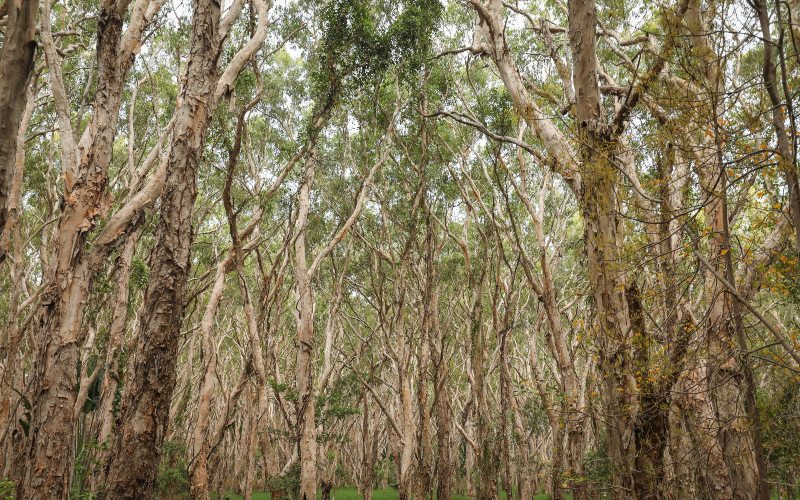Court bans eucalyptus planting near water sources nationwide

Justice Mugo Kamau ruled that eucalyptus must be at least 30 metres away from rivers, lakes, wetlands, dams, streams, ponds, and oceans, and 10 metres from adjacent plots.
The Environment and Lands Court in Ol Kalou has placed nationwide restrictions on the planting of eucalyptus trees near water sources and neighbouring properties.
Justice Mugo Kamau ruled that eucalyptus must be at least 30 metres away from rivers, lakes, wetlands, dams, streams, ponds, and oceans, and 10 metres from adjacent plots.
More To Read
- MPs outline conditions to be met before forests can be degazetted
- Truck that overturned in Uasin Gishu was ferrying natural rubber latex to DRC
- New KIPPRA report exposes the hidden weaknesses crippling Kenya’s forest industry
- Governor Sakaja says Sh180 billion needed to clean Nairobi's main rivers
- City residents living along riparian corridors assured of fair treatment in relocation plans
- KFS refutes land grabbing claims at Menengai Crater, says boundary gazetted
He further directed Parliament to enact legislation regulating eucalyptus cultivation within 12 months. Until then, interim rules will guide where and how these trees may be planted.
According to the court, any eucalyptus planted less than 30 metres from a water source must either be removed or its planting prohibited. Trees in marshy or swampy areas will require clearance from the Cabinet Secretary for Environment and Climate Change.
Planting is also restricted on irrigated farmland, parcels smaller than a quarter-acre, or in regions receiving below 400mm of rainfall annually.
“For avoidance of doubt, these orders shall apply nationwide, and the respondents must ensure compliance with the court’s judgment,” Justice Mugo stated.
The decision follows a petition filed in 2022 by environmental lawyer Wilfred Omariba, who argued that uncontrolled eucalyptus cultivation has contributed to the drying up of rivers, lakes, and wetlands in several counties.
He pointed to Kisii and Nyamira, where the widespread planting of blue gums has lowered water levels, creating long-term risks for the country’s water security.
“Eucalyptus trees have been planted near wetlands, springs, and water catchment areas for over 40 years under government supervision, yet no law regulates their growth,” Omariba said.
“The reduced water volumes have sparked conflicts among residents forced to queue for water and compelled the government to drill boreholes. Kisii and Nyamira, once self-sufficient in food production, now buy food from other counties. Eucalyptus trees are largely to blame.”
Introduced in Kenya in 1902 to supply firewood for the Kenya-Uganda Railway, eucalyptus trees are now cultivated widely for poles, timber, firewood, plywood, and fencing due to their fast growth.
Omariba warned that wetland counties could face desertification within 50 years if the planting continues unchecked.
The petition named the Cabinet Secretaries for Environment and Water, the Kenya Forest Service (KFS), the National Environment Management Authority (NEMA), and the Attorney General as respondents.
The court granted the government 45 days before the orders take effect. Responding to the verdict, Omariba described it as a major win for Kenyans and the environment.
“People plant Eucalyptus on boundaries and small plots, denying neighbours sunlight, preventing crops from growing, and even affecting pasture. This ruling will protect the environment for posterity,” he said.
The private sector also welcomed the judgment but stressed careful execution. Kaberia Kamencu, Chair of the Timber and Furniture Sector at the Kenya Association of Manufacturers, noted that eucalyptus’ dual root system – shallow lateral roots and deep sinkers – allows it to absorb water and nutrients aggressively, often outcompeting nearby plants.
Its roots can also damage walls and building foundations. Kamencu emphasised the need to guide farmers on planting eucalyptus in suitable locations and to consider alternative species.
“Most trees left by the colonial government - pine, cypress, Eucalyptus, and Grevillea - were already planted. Farmers need guidance to balance growth with environmental safety,” he said.
Eucalyptus ranks as the third most used timber in Kenya, valued for its rapid growth and versatility in poles, pulp, paper, and posts. While policy restrictions have limited its adoption in some markets, it remains essential in Western Kenya, tea plantations, and private estates.
Top Stories Today













































